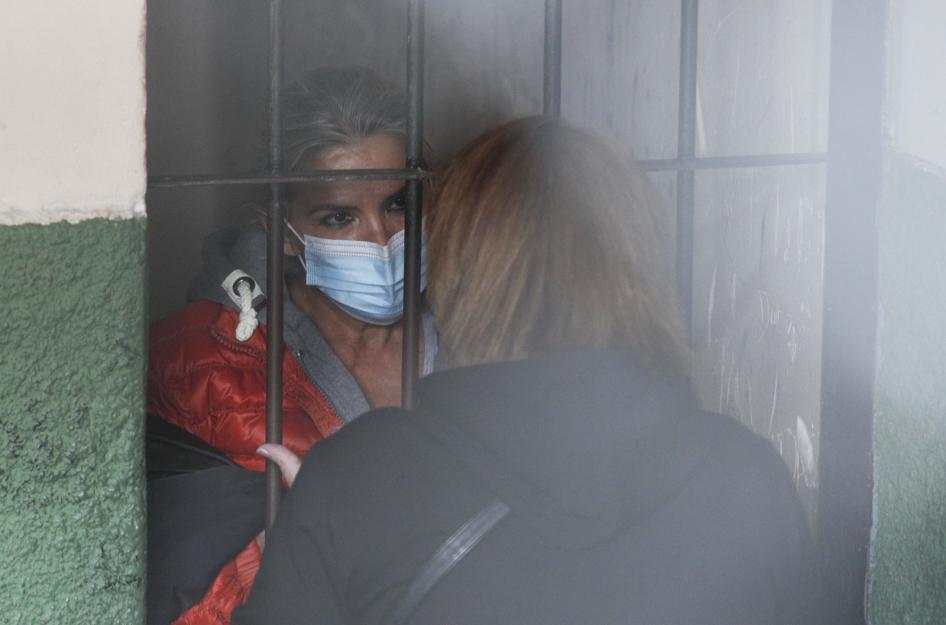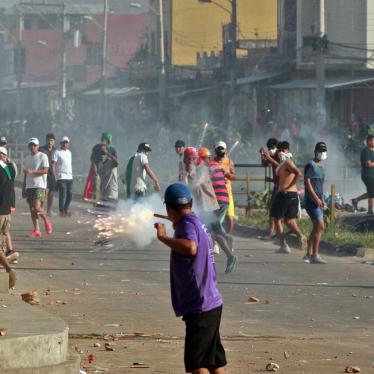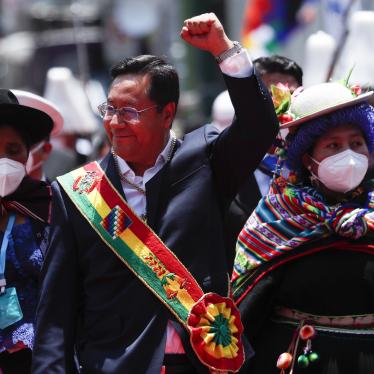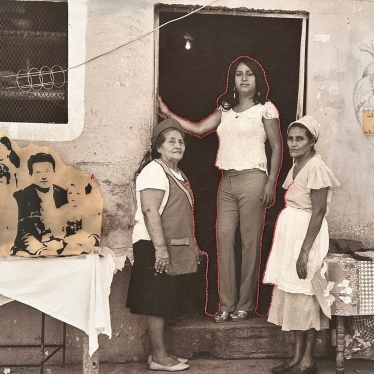It is ironic that Jeanine Áñez, a conservative politician who served as Bolivia’s interim president for a year, was detained on March 13 on charges of “terrorism” and other crimes. Under her administration, which ended in November, prosecutors used the same overbroad definition of “terrorism,” to pursue her predecessor, Evo Morales. Both cases show the dangers of a justice system that is pliant to those in power and the urgent need for reform.
Lack of independence plagued the Bolivian justice system during the 14 years Morales was in power, but the Áñez administration was no better. Her government publicly pressured prosecutors to further its political interests, leading to criminal investigations of more than 100 supporters of Morales’ leftist Movement to Socialism (MAS, in Spanish) for sedition and/or terrorism. Scores more were under criminal investigation for belonging to a criminal organization, dereliction of duty, and other crimes. There was strong evidence that many cases were politically motivated.
The more than 1,500 pages in the case file against Morales, which we reviewed, contained zero evidence he had committed acts that would appropriately be considered terrorism. Similarly, the terrorism charges against Áñez are grossly disproportionate.
Morales was never detained, as he was in exile abroad. Áñez faces four months in pretrial detention, and up to 24 years in prison if convicted.
In October, Luis Arce, the MAS candidate, won presidential elections by a wide margin. Shortly after, Arce said in an interview with El País that justice “is a debt we at MAS owe” the people and promised that during his government there would be no political pressure on prosecutors and judges. In November, he created a commission of experts to draft reform proposals for an independent justice system. Those words and actions now seem hollow.
The police detained Áñez and two of her former ministers on charges of “terrorism,” “sedition,” and “conspiracy” for their alleged participation in a coup against Morales in November 2019. An arrest warrant is pending for three other former ministers. Prosecutors opened the case based on a complaint by a former MAS member of Congress and the government defended the arrests.
The opposition denies there was a coup, maintaining that Morales resigned after tens of thousands of Bolivians protested alleged electoral fraud in the October 2019 elections. Electoral observers from the Organization of American States and European Union pointed out serious irregularities. MAS supporters contend that there was no such fraud and opposition leaders conspired to take over the government.
What is clear that the military and police commanders publicly “suggested” to Morales that he should resign, which he did. The attorney general’s office should thoroughly investigate allegations of infringements on people’s right to vote and to have their vote respected whether through electoral fraud, threats, or other actions to overturn the will of the voters. But such investigations should fully respect due process and fair trial rights. Any charges should be based on adequate evidence and should be proportionate to the alleged conduct.
The charging document against Áñez and two former ministers, which we reviewed, alleges that they “promoted, directed, were members and supported” organizations whose objective was to break Bolivia’s “constitutional order.” The evidence against Áñez is unclear in the document.
Áñez, then second vice president of the Senate, became interim president on November 12, 2019, after the resignation of four other MAS authorities who preceded her in the line of succession. One of them, the president of the Chamber of Deputies, was forced to step down after a mob took his brother hostage and demanded his resignation.
The Constitutional Tribunal said that Áñez was the legal interim president of Bolivia, concluding that the next person in the line of succession becomes interim president.
The current Justice Minister has said that the case against Áñez refers to her conduct prior to becoming interim president. Egregious human rights violations were committed during Áñez´s presidency, though, and those responsible have yet to be held accountable.
On November 15, 2019, Áñez issued a decree granting the military overly broad discretion to use force against protesters. The same day 10 MAS supporters were killed in in the central town of Sacaba and another 10 were killed in Senkata, on the outskirts of La Paz, on November 19. Witnesses told us that state forces opened fire on protesters in the two cases.
In October and November 2019, both MAS supporters and their opponents allegedly carried out very serious acts of violence, including arson and abduction. In addition, MAS supporters allegedly killed two anti-Morales demonstrators in the town of Montero.
A vaguely worded decree approved in February 2021 by the Plurinational Assembly, where MAS has a majority, provides a blanket amnesty and pardon for people prosecuted during the Áñez administration for crimes related to the “political crisis” that started in October 2019. MAS leaders have made it clear that the decree is designed to apply to MAS supporters.
Victims will not be served by one-sided investigations that violate due process rights, that will be questioned inside and outside of Bolivia, and that undermine the rule of law. They deserve real, impartial justice and that all those responsible be held accountable, without any amnesties or pardons based on their political opinion.
During the Áñez administration, we called on prosecutors to drop abusive charges and uphold human rights. We ask the same now.










